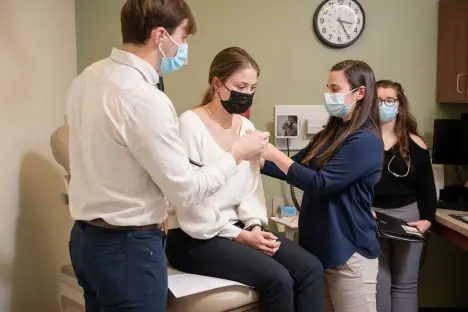COVID-19
As of August 18, 2025, the Centers for Disease Control (CDC) updated the Covid-19 guidelines. The new guidelines align with other common respiratory viral illnesses including Covid-19, flu and RSV. Information regarding the new guidelines can be found at Respiratory Virus Guidance (cdc.gov).
The new guidance recommends staying home and away from others until your symptoms are improving and you are fever free for at least 24 hours without the use of fever reducing medication. When resuming normal activities, you are encouraged to take additional precautions for the next 5 days such as wearing a well-fitting mask, keeping a distance from others and practicing good hygiene methods. It is also recommended that you get tested as there are treatments available. If your healthcare provider feels that treatment would benefit you, the treatment must be prescribed soon after your symptoms begin.
This updated guidance is for community settings. For those individuals in the College of Nursing and Health Sciences or a healthcare setting there is no change. Individuals in the College of Nursing and Health Science Program are not permitted to return to a healthcare setting, clinical site, etc., until after a 5 day isolation period, symptoms are improving or resolved and you are fever free without the use of fever reducing medication for at least 24 hours. College of Nursing and Health Science students/employees are permitted to return to class after symptoms are improving and fever free for at least 24 hours, which is the same as the campus community.
Campus Assistance will only be provided to students in the College of Nursing and Health Science Program that are not permitted to attend clinical rotations or visit healthcare facilities due to testing positive for Covid-19. Instructions for campus assistance will be provided to these students by the Student Health Center upon knowledge of a positive test.

What is COVID-19?
COVID-19 is a disease caused by a coronavirus called SARS-CoV-2. Coronaviruses typically cause symptoms that are similar to the flu and other viral illnesses. Some people infected with COVID-19 have no symptoms, while others exhibit symptoms such as:
- Fever or chills
- Cough
- Shortness of breath or difficulty breathing
- Fatigue
- Muscle or body aches
- Headache
- New loss of taste or smell
- Sore throat
- Congestion or runny nose
- Nausea or vomiting
- Diarrhea
More severe symptoms that require emergency medical attention may include:
- Trouble breathing
- Persistent pain or pressure in the chest
- New confusion
- Inability to wake or stay awake
- Bluish lips or face
If you are seriously ill or exhibit severe symptoms, seek immediate medical attention from your healthcare provider or the nearest emergency department. It’s important to call before your arrival to ensure proper care and to report your concern of COVID-19.
Certain high-risk individuals are more likely than others to become severely ill from COVID-19. Contributing risk factors may include the following:
- Old age
- Pre-existing health conditions, such as:
- A compromised immune system
- Diabetes
- Heart or kidney disease
- Chronic lung disease, including asthma
- Liver disease
- Hemoglobin disorders
- Severe obesity
- Pregnancy or recent pregnancy
For more information on high-risk individuals, visit the CDC’s website.
How Do I Stay Healthy?
The best way to protect yourself from COVID-19 is to practice routine hygiene etiquette:
- Stay home when you are sick.
- Avoid close contact with people who are sick.
- Avoid crowds and large gatherings.
- Get adequate sleep and eat well-balanced meals.
- Cover your mouth and nose with a tissue or sleeve when you sneeze or cough.
- Wash your hands with soap and water for 20 seconds or longer or use hand sanitizer (60% - 90% alcohol).
- Avoid touching your eyes, nose or mouth with unwashed hands or after touching surfaces.
- Clean and disinfect commonly used surfaces and items often.
Your mental health is just as important as your physical health. For more information on coping with COVID-19, visit our Psychological Counseling Services page.

AU and Respiratory Illnesses
The Ashland University Student Health Center takes active steps each semester to lower the presence of common respiratory viral illnesses such as COVID-19, flu and RSV in our community. We work closely with the Ashland County Health Department and follow guidance from state and federal health officials to lower the rate of infection and bolster the health of students and employees.
The Student Health Center is happy to assist you and will provide you with guidance and resources related to COVID-19, flu and RSV.
In the event of a known case of COVID-19 or flu on campus, the Student Health Center will notify the Ashland County Health Department of the positive case.

Guidelines
The university's approach to COVID-19 continues to evolve in accordance with updated public health guidance and the widespread availability of vaccines, face coverings, tests and treatments to prevent and mitigate the impact and spread of the disease.
Vaccination strongly encouraged: All members of the campus community and those who attend events on campus are strongly encouraged to be vaccinated for COVID-19 with a complete initial vaccine series and any eligible boosters. Flu and RSV vaccines are also encouraged. The Ashland County Health Department and many pharmacies offer vaccines and boosters.
Monitor symptoms daily: Monitor yourself for symptoms of COVID-19 or any illness. If you are ill, please stay home and away from others until your symptoms have improved or resolved and you are fever free for at least 24 hours. Employees are encouraged to contact their healthcare provider for illness. Students should contact the Student Health Center at 419-289-5200 or healthcenter@ashland.edu.
Testing: COVID-19 testing is available through local pharmacies, home test kits and healthcare providers. Symptomatic individuals are encouraged to be tested for COVID-19. Any student who tests positive for COVID-19 should notify the Student Health Center at 419-289-5200 or healthcenter@ashland.edu.
Face coverings: All campus community members are welcome to wear a face covering at any time and high quality masks are widely available. Face coverings are optional when receiving services in the Student Health Center. Student Health Center Associates and/or providers who are requested to wear a mask by a patient while being treated in the Student Health Center for that visit will do so upon request.
Universal Infection Control Measures: Handwashing, good ventilation, use of outdoor spaces, frequent surface disinfection, and the use of face coverings are important measures to reduce the spread of infectious diseases. Please continue to be vigilant with the prevention measures, stay home/in your room if you are ill and contact the Student Health Center at 419-289-5200 or healthcenter@ashland.edu.
Know Your Risk: If you are at a higher risk for severe complications from COVID-19, flu or RSV, please take additional precautions to reduce your likelihood of infection, such as regular use of face-coverings and avoiding large gatherings when the community rate of transmission is elevated.
This information is subject to change based upon local conditions and updated guidance from health authorities.